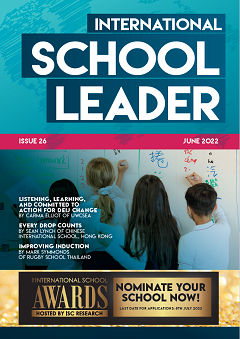By Michael Tower
The International School Ho Chi Minh City – American Academy won the Safeguarding awards at the 2022 International School Awards for an initiative that protects students from abuse and trains international schools in child protection practices. Michael Tower, the school’s Safeguarding Lead, shares details.
A common part of mandatory safeguarding training is a recounting of statistics on child abuse. The point often made is that child abuse is common. As international school leaders, it’s important to reflect with staff on how aware we are of students in our community who have actually experienced abuse. Are we supporting students at the same rate as we know child abuse occurs in our communities? Often, students under-report abuse and are not receiving support for these overwhelming challenges. We know a variety of personal and academic challenges occur for these students, especially when the trauma remains unaddressed.
Enabling disclosure
At ISHCMC – American Academy, we embarked on a coordinated effort to empower students to disclose abuse. Every student in the school participated in a series of lessons to train them to recognise physical, sexual and emotional abuse. During the lessons, students learned how to protect themselves and their friends, as well as how the school would respond to a disclosure. In the lessons, we embedded a virtual platform that enabled students to privately disclose information to the counselling team. One middle school girl wrote during a lesson about sexual abuse, “What if the abuser manipulates me and people around me? What if the abuser guilt trips me and/or makes me think it never happened?”. By directly asking students if they had experienced any of these traumas, the school was able to actively support students and families for difficulties that had lingered without intervention.
Hotspot mapping is a common contextual safeguarding practice that asks children to identify physical locations in the school where they feel unsafe. At ISHCMC – American Academy, we extended the scope of hotspot mapping to include online safety and social media, given so much of a student’s social life takes place online. By directly asking students, we learned that 20% of our high school girls were solicited online for sexual videos and images. We also learned that on specific platforms like Omegle, middle school boys were being targeted for paid sexual exploitation. Student survey responses allowed us to immediately intervene in risky situations online, including uncovering a pattern of online sexual harassment of our high school girls from perpetrators in the city. Hotspot mapping the digital lives of our students also allowed us to build classroom lessons and deliver parent seminars on the specific risks our students face.
Readying staff to manage allegations
Many international schools operate in local contexts where there is not an effective child protection authority and community services to support a family in crisis. And yet, students and families still need intervention and support when abuse occurs. It is important to assess staff readiness to manage and support these challenging situations.
Teachers often have the closest relationships with students and need to be prepared to respond to students’ disclosures of abuse. We worked with students to develop training focused on disclosing information to teachers to help them actively recognise allegations of abuse. This led to a culture of teachers actively recognising purposeful and accidental disclosures of abuse and alerting the counselling team to respond.
School counsellors can offer a variety of skill sets – university and career advising, academic advising, social–emotional counselling, and more. In the context of safeguarding, students disclosing abuse rely on a counsellor equipped with forensic interviewing skills to ascertain the facts of the abuse, interview alleged perpetrators and support parents with difficult conversations. Students and families in crisis also rely on a counsellor that can help navigate the short-term and long-term effects of trauma. ISHCMC – American Academy has intentionally recruited counsellors with child protection skills to lead on safeguarding matters. This includes carrying out investigations, supporting students and families experiencing trauma, and training staff across the school.
The school has built the capacity to conduct child protection investigations with practices that meet the standard for legal review. One of these practices is the use of a multi-disciplinary crisis management team that collaboratively manages each child protection matter. This team brings together school leadership, counsellors, medical staff and legal advisors to navigate each case.
Building capacity in the international school community
We collaborate with designated safeguarding leads across Asia, including other schools in the Cognita Schools Group. For several years, we have offered training on forensic interviewing, crisis management and childhood trauma.
This training supports safeguarding leads to practice objective interviewing techniques with alleged victims and perpetrators, and develops their knowledge of how to ask about physical abuse, sexual abuse and emotional abuse for children of different ages. Counsellors often have varied educational and work backgrounds, and it’s important to support their professional development.
The crisis management training we offer supports schools to establish a team that centrally manages safeguarding matters. We identify which school staff play a role in crisis management, and the protocol for team meetings. The protocol includes the documentation of facts, action steps and rationale for decisions for each matter. These practices ensure reliable investigations to address the disclosure, and also manage risks to the school when being involved in circumstances that may trigger police or consulate involvement.
Moving forward
We are beginning to establish a model of how to amplify student voices and disclosure in our context, though serious challenges remain about how to support students’ increasing mental health needs. We are looking at ways to grow our ability to support recovery from trauma given the constraints of a school setting. We are also asking how we can ensure these efforts are sustainable over time and with staff turnover.
Every disclosure of abuse continues to be an opportunity for reflection of how we can enhance our child abuse prevention, intervene earlier and provide effective support to minimise the effects of trauma. Amplifying students’ voices regarding their own protection will continue to drive how we navigate safeguarding students in our care.
5 steps towards effective support
- Reflect: What is the frequency of child abuse disclosed by students, and what are the actual rates of abuse in your community?
- Discuss: Do counselling and teaching staff believe they are prepared to respond to allegations of child abuse and support families?
- Prepare: Consider the skills necessary to manage child abuse in your context, and ensure training is in place for staff.
- Empower: Educate students on how to recognise child abuse and how the school will respond to disclosures. Include parents and raise awareness of the school’s priority on child protection.
- Track: Develop approaches to identify students who have experienced abuse, including peer-on-peer abuse, family violence and online exploitation.

Michael Tower is school-wide Safeguarding Lead and Clinical Specialist at International School Ho Chi Minh City – American Academy Connect with Michael on LinkedIn.


